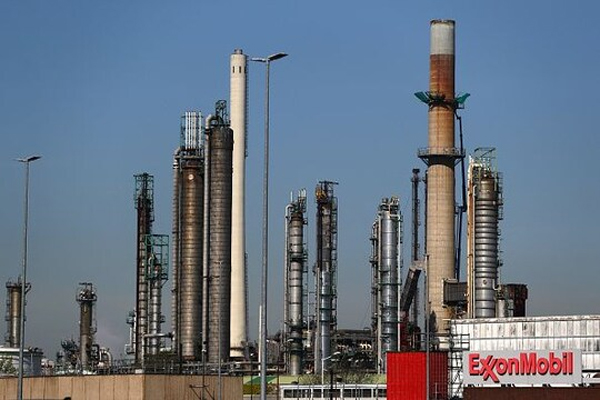In promising to lower a small share of emissions, the company illuminates
society’s failure to meaningfully reduce demand for fossil fuels.

Exxon Mobil Corp. is going net-zero. Kinda. Well, not really.
The oil major announced Tuesday that it aims to have net-zero emissions from its operated assets by 2050, on a scope 1 and 2 basis. That is, emissions related to the production of oil and gas, not their use. This matters quite a bit when you consider that more than four-fifths of emissions from those fossil fuels relate to their use, or so-called scope 3 emissions. In short, from a societal perspective, there is no such thing as being net-zero on scope 1 and 2 emissions; it’s like being half — or, more accurately, one-fifth — pregnant.
Nonetheless, Exxon’s move is useful. First, it’s not nothing for one of the world’s largest oil majors to announce any net-zero target. Deep cuts to emissions of methane, for example, represent a win against one of the most potent greenhouse gases, and may help persuade others in the industry (including its supposed regulators) to curb routine venting. Second, this is Exxon, a company that spent many years denying or obfuscating the whole concept of climate change.(1)Sure, it’s taken the unexpected loss of a proxy battle to get to this point, but still.
The most important aspect of this concerns those scope 3 emissions, however. Exxon only reluctantly began to report a scope 3 estimate last year, after announcing it would do so with the press-release equivalent of an “OK! If you insist! God!”:
ExxonMobil will also provide Scope 3 emissions on an annual basis, but notes that reporting of these indirect emissions does not ultimately incentivize reductions by the actual emitters. Meaningful decreases in global greenhouse gas emissions will require changes in society’s energy choices coupled with the development and deployment of affordable lower-emission technologies.
The thing is, Exxon isn’t wrong. Modern society is built on the profligate use of fossil fuels, both for energy and as chemical inputs. Amid the recent strength in oil and gas markets, fans have positively bathed in schadenfreude, linking high prices with a campaign against fossil-fuel supply while little is done to address the key issue: demand. On this reading, the oil and gas industry is working to meet society’s needs but is being stymied by a coalition of haters. Indeed, Exxon defines scope 3 as “indirect emissions resulting from society’s need for and use of the Company’s products.” (Emphasis added.)
There is, however, a problem with this narrative of victimhood. In an alternate reality, oil and gas companies are neutral entities merely supplying demand, whether it goes up or down. In the reality that you and I call reality, oil and gas companies have lobbied assiduously to ensure that nothing — not even potentially catastrophic climate change — affects that demand. Exxon may no longer be the company of Lee Raymond, the formidable former CEO who aggressively opposed the very idea of climate change linked to the burning of fossil fuels. But we are still living with the political legacy. And last year’s video-gate scandal, wherein Exxon lobbyists were caught saying several quiet parts out loud, rather suggested the company hadn’t quite gotten out of the business of making sure society’s “need for” its products remains needful. (Exxon said their comments were inaccurate and inconsistent with its commitments.)
Fossil fuels’ centrality to modern life can be used as an argument for deifying them. A more nuanced approach is to acknowledge the enormous advances they have fueled — and then channel those advances into addressing the fuels’ inherent, carbon-based flaw. Reducing absolute demand for fossil fuels in favor of alternatives is absolutely society’s call. But let’s not pretend the producers have no say in it.
(1) For a good overview of that history, see “Private Empire: ExxonMobil And American Power,” by Steve Coll (Penguin, 2012), especially chapter three.
This column does not necessarily reflect the opinion of the editorial board or Bloomberg LP and its owners.
Liam Denning is a Bloomberg Opinion columnist covering energy, mining and commodities. He previously was editor of the Wall Street Journal’s Heard on the Street column and wrote for the Financial Times’ Lex column. He was also an investment banker. Energiesnet.com does not necessarily share these views.
Editor’s Note: This article was originally published by Bloomberg Opinion, on January 18, 2022. All comments posted and published on EnergiesNet.com, do not reflect either for or against the opinion expressed in the comment as an endorsement of EnergiesNet.com or Petroleumworld.
Use Notice: This site contains copyrighted material the use of which has not always been specifically authorized by the copyright owner. We are making such material available in our efforts to advance understanding of issues of environmental and humanitarian significance. We believe this constitutes a ‘fair use’ of any such copyrighted material as provided for in section 107 of the US Copyright Law. In accordance with Title 17 U.S.C. Section 107. For more information go to: http://www.law.cornell.edu/uscode/17/107.shtml.
bloomberg.com 01 18 2022












